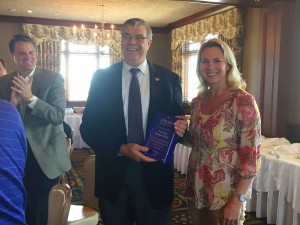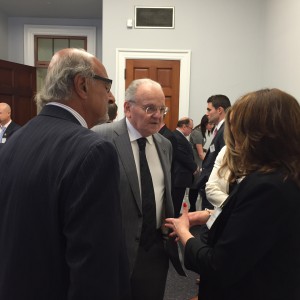Eric Dean, General President of Ironworkers International and Chairman of the Pharmaceutical Industry Labor-Management Association (PILMA) authored the following article on the importance of strong intellectual property protections for job growth.
Click here to view the article on The Hill.
As the general president of the Ironworkers union, representing 130,000 skilled craft workers in North America, one of my most important responsibilities is to help protect the jobs of highly skilled workers.
The men and women who are members of my union, Ironworkers International, have undergone rigorous apprenticeship training. They have dedicated long nights, days and weekends to hone their craft and earn the right to return to the job site the next day. The building trades are committed to equipping their members with cutting-edge skill sets to be the best. They have over 1600 training facilities located in every state in the U.S. and train thousands of members a year, using zero taxpayer dollars.
The benefit from undergoing extensive training should be good paying jobs with healthcare and pension benefits, all earned by helping to build America’s infrastructure and meeting the construction needs of American business.
There is one industry in particular that depends on our meticulous skill set for their own survival. The biopharmaceutical industry knows that state-of-the-art facilities are essential to discovering life-saving medicines and therapies. For each new drug developed, facilities must be wiped clean, whole systems must be replaced while guaranteeing no cross contamination.
This industry relies on the building construction trades unions to build, maintain and retrofit these facilities. In order to meet the rigorous standards of biopharmaceutical manufacturers, our training centers align curriculum to the needs of the industry. The development of new life saving drugs depends on this key relationship.
At a time when the regulatory environment surrounding medicines is continually in flux, building and retrofitting biopharmaceutical manufacturing and research facilities must be flawlessly executed on schedule. Our skill, reliability and professionalism create a foundation of certainty that the job will be done on time, on budget and right the first time.
At the same time, while these companies rely on a skilled craft workforce to help them construct the facilities where they research and discover new medicines, they also rely on an intellectual property regime that will provide continuity and certainty for these life-saving medicines. Our patent system ensures that products developed by companies here in the United States will not be pirated and sold illegally.
As chairman of the Pharmaceutical Industry Labor-Management Association (PILMA), a coalition of labor unions and companies in the biopharmaceutical industry dedicated to innovation and growing the economy, I cannot stress enough the importance of strong intellectual property protections to economic growth.
The logic is plain and simple: Patents are surrounded by current jobs, and future jobs. Strong IP protections help create a stable environment for businesses to invest, for innovation to thrive and for new development. Each new facility presents an opportunity for our members to earn a living, support their family and maintain stability in the middle class.
The United States is the most innovative country in the world and we must keep it that way. The more a country invests in its research and development, the stronger the economy. On average it takes 10-15 years to develop a new drug, costing $2.6 billion, and most never even make it to market. The U.S. must ensure that the investment of time, money and human capital will be protected if biopharmaceutical companies are successful and have the opportunity to earn a return.
Our members take great pride in their work. The satisfaction of building a structure that will be a permanent part of a city’s skyline is unmatched only by the fulfillment of building a facility that will cure diseases and saves lives.
Patents are the foundation of innovation. It is what biopharmaceutical companies are built on. Labor and industry have fulfilled their commitment to working together. Now it’s time for the United States Congress to renew its commitment to protecting innovation and the livelihoods of the best trained workers in the world.



